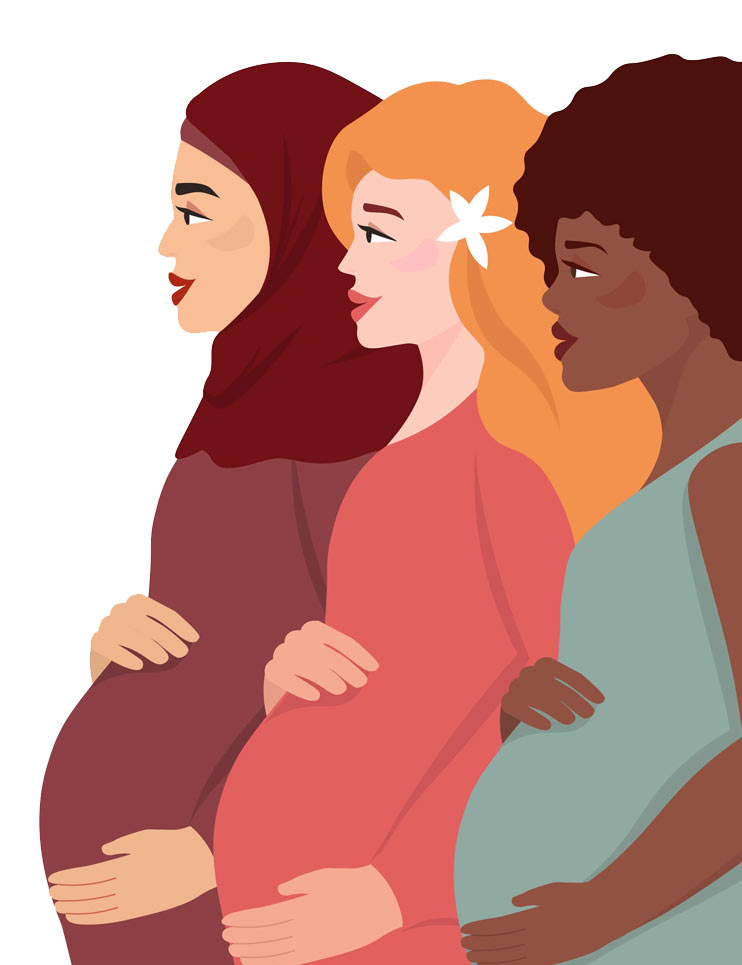Child and maternal health are key components of every country's growth. Maternal health till date is concerned with the health of women through gestation, childbirth, and the postpartum period. Healthy nutrition during preconception is an important component of this journey from womanhood to motherhood, which has not yet been sufficiently explored. It is not uncommon for women to experience health problems during pregnancy; these difficulties can impact their health, foetal development, or both. Most common congenital anomalies of foetuses; like neural tube defects, can be significantly reduced using preventative measures. So preconception care plays a vital role in foetal development and overall maternal health. With the advent of artificial intelligence and digital technologies, aim is to develop a promising strategy to identify risks during preconception, conception, different stages of foetal development, high-risk mothers and neonates. Aim is to reduce stillbirths, maternal deaths and childbirth complications using AI and Machine Learning. At present we are focussing on: Ultrasound imaging, MRI - pilot, T2, dynamic scans, Preconception kits, Preconception Care and Nutrition apps and clinical trials, Maternal and Postpartum nutrition and affordable devices for maternal/foetal care. The group will work in collaboration with the Translational Health Science and Technology Institute (THSTI) and ESIC at Faridabad, on maternal health and aim at developing apps to help women in conception.


WHO Key facts:
- Every day in 2020, almost 800 women died from preventable causes related to pregnancy and childbirth.
- A maternal death occurred almost every two minutes in 2020. Between 2000 and 2020, the maternal mortality ratio (MMR, number of maternal deaths per 100 000 live births) dropped by about 34% worldwide.
- Almost 95% of all maternal deaths occurred in low and lower middle-income countries in 2020.
- Care by skilled health professionals before, during and after childbirth can save the lives of women and newborns.
- The number of maternal deaths per one lakh live births due to pregnancy and childbirth complications is 97.
- Every 16 seconds one baby is stillborn. That amounts to more than two million stillborn babies globally every year.
- Every day 67,385 babies are born in India, that’s one sixth of the world’s child births. Every minute one of these newborns dies.
Research Publications:
- M. Singh, L Jiancong, S. N. Silva, A. Uus and J. Hutter, “Medical image Segmentation Network for 3D Fetal MRI images based on 3D U-Net”, Applied Bioscience and Biotechnology Conference 2023, Barcelona, Spain, 23-24 October, 2023.
- M. Singh, F. Haochan, S. N. Silva and J. Hutter, “3D Fetal Reconstruction from T2 scans using Kullback-Leibler Divergence”, Applied Bioscience and Biotechnology Conference 2023, Barcelona, Spain, 23-24 October, 2023.
- M. Singh, S. N. Silva, A. Uus, I. Grigorescu, M. Rutherford, J. Hajnal and J. Hutter, “Real-time survey base estimation of Gestational age to guide a fetal MRI scan”, ISMRM Annual Meeting 2022, London, UK, 7-12 May, 2022.
- M. Singh, A. Ranjan, S. N. Silva, A. Uus, I. Grigorescu, M. Deprez, M. Rutherford and J. Hutter, “Estimating fetal gestational age using MRI survey scans”, ISMRM British & Irish Chapter – MR-Fest: A Celebration of Magnetic Resonance, London, UK, 13-17 September, 2021.
- M. Singh, A. Ranjan, A. Uus, I. Grigorescu, S. N. Silva, M. Rutherford, L. Story and J. Hutter, “Automated detection of fetal state using MRI pilot scans”, ISMRM British & Irish Chapter – MR-Fest: A Celebration of Magnetic Resonance, London, UK, 13-17 September, 2021.



